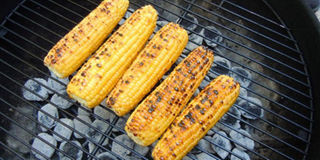Roast maize banned as famine fears grip region

What you need to know:
- Ms Rosemary Senyamile, the District Commissioner, announced the surprise ban last week.
- She said farmers, especially those in lowland areas where the situation is reportedly the worst, should instead dry their maize for storage.
Same. District authorities have banned the roasting of maize for selling purposes as they battle to save what food they can in the face of a hunger crisis.
Ms Rosemary Senyamile, the District Commissioner, announced the surprise ban last week.
She said farmers, especially those in lowland areas where the situation is reportedly the worst, should instead dry their maize for storage.
Taking advantage of high demand by travellers on highways, a number of cereal farmers in Same District, Kilimanjaro Region, make ends meet through selling roast maize.
“The roasting of maize should now be considered a luxury,” the District Commissioner said, warning that the unpredectable rain pattern posed a serious threat to food security.
“Maize should be left to dry on the farms, and later stored as family food because the food situation in the district is worrying this year.”
Ms Senyamile said although the rainy season was not yet over, there were enough indications that there would not be enough harvest in the region this season.
The DC urged agricultural extension officers to work closely with farmers to ensure the region fully utilised the available rains to grow crops, which suited their terrains.
Her warning on the likely food crisis in the district comes only weeks after over 400 hectares of rice fields in Mkomazi valley in Same District was reportedly damaged by the grain eating quelea quelea birds, raising fresh fears of poor harvests.
Mr Kapongo Sonda, chairman of the Ndungu Rice Scheme, told The Citizen recently that the situation was serious. He noted that there had not been any response from the responsible authorities in the government, despite several appeals.
According to him, the scheme has a total of 680 hectares of rice, and out of that, 442 hectares have been devoured by the red-billed birds.




